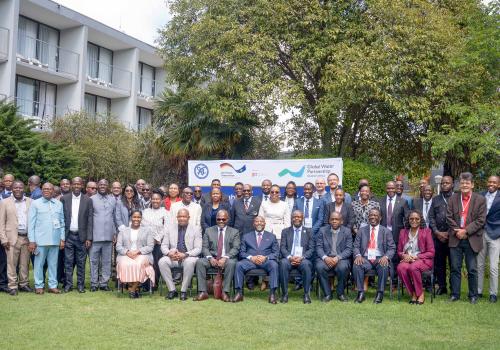The 11th Southern African Development Community (SADC) Multi-Stakeholder Water Dialogue held in Maseru, Lesotho, from 29 to 30 September 2025 focused on reviewing water-related initiatives within the Water-Energy-Food-Ecosystems (WEFE) Nexus framework to strengthen the implementation of SADC’s new smart regional economic corridors, ensuring integrated and sustainable development across the region.
The dialogue focused on the development of value propositions, the strengthening of water security, promotion of regional value chains development, design of investment plans, and the establishment of roadmaps for corridor development. It further aimed to promote innovative and climate-resilient infrastructure to support trade and value chains, to strengthen cross-sectoral partnerships across water, energy, agriculture, transport, and ICT to advance policy and investment recommendations with an emphasis on transboundary cooperation and regional development.
Held under the theme “Water Security, Innovation, and Nexus Action: Watering and Enabling Regional Economic Development Corridors for Transformation in SADC,” the Dialogue underscored the need to move beyond siloed planning and to fully integrate the WEFE Nexus approach into regional strategies.
Honourable Mohlomi Moleko, Minister of Natural Resources of the Kingdom of Lesotho, acknowledged SADC’s consistent commitment to fostering a shared vision on water for regional integration, inclusive development, and prosperity. He emphasised that water underpins economic growth through agriculture and industry, ensures public health through safe drinking water and sanitation and contributes to fostering cooperation on shared resources.
Without water, he noted, the region cannot achieve inclusive growth, food and energy security, or sustainable industrial transformation. He reiterated that water must be placed at the centre of planning and investment, where it serves not only as a trade enabler but also as a lifeline that builds resilience.
Dr. Patrice Kabeya, Senior Programmes Officer for Water at the SADC Secretariat, speaking on behalf of Ms. Mapolao Mokoena, the SADC Director of Infrastructure, presented data on the current state of the regional water and energy sectors. He reported that only 63% of the region’s population has access to water and 37% to sanitation, both of which remain far below the 2030 target of 80%. He further noted that dam storage capacity amounts to just 18% of annual renewable water resources. On energy, he highlighted that electricity access improved from 48% in 2019 to 56% in 2024, though it remains short of the 85% target. Renewable energy accounts for only 35% of the regional energy mix, also below the set target.
Dr. Kabeya emphasised the need to intensify the development of regional economic corridors as a vehicle for realignment in order to achieve greater regional impact. He called for deeper integration through the WEFE Nexus and for mainstreaming cross-cutting sectors such as transport, ICT, climate, and Disaster Risk Reduction (DRR) to strengthen corridor development and enhance regional resilience.
Ms. Simone Goertz, Head of Economic and Development Cooperation at the German Embassy in Botswana, highlighted the long-standing partnership between Germany and SADC, implemented through the Gesellschaft für Internationale Zusammenarbeit (GIZ) GmbH, which has supported transboundary water management in the region for over 20 years. The Germany support includes institutional strengthening, infrastructure development, capacity building, climate resilience and regional cooperation.
Ms. Goertz commended this cooperation as a milestone in advancing the WEFE Nexus, which has placed SADC in a stronger position to integrate the management of water, energy, and food resources.
Other speakers included Ms. Anna Renieri, Head of Cooperation at the European Union Delegation to Lesotho; Mr. Andrew Takawira, Interim Executive Secretary of the Global Water Partnership Southern Africa (GWPSA) and Ms. Relebohile Lebeta, Principal Secretary for the Ministry of Natural Resources of the Kingdom of Lesotho. They emphasised the importance of water in safeguarding ecosystems that support livelihoods, enabling the development of economic corridors, and contributing to regional economic transformation. They also underscored the need to strengthen collaboration with River Basin Organisations, enhance institutional linkages, and mobilise financing to support water sector growth and management.
Discussions at the Dialogue covered a broad spectrum of issues, including policy, vision, and institutional alignment; the role of water in regional and continental corridor development; climate-resilient and risk-informed water infrastructure solutions to support trade and value chains; and financing Nexus-based investments and partnerships for inclusive and sustainable regional economic growth.
The Dialogue was convened in partnership with the Government of the Kingdom of Lesotho and supported by the Government of Germany through the SADC-German Transboundary Water Management (TWM) Project, which is implemented by GIZ in collaboration with the Global Water Partnership Southern Africa.
The biennial platform brought together water practitioners, policymakers, and representatives from the water, energy, agriculture, environment, nature conservation, tourism, and finance sectors, along with relevant public and private institutions, and youth and gender groups, to deliberate on strategies for regional integration, sustainability, and inclusive growth within this theme of smart and integrated regional economic corridor development to which the water and other WEFE Nexus sectors must contribute.
| Attachment | Size |
|---|---|
| Key Note Address by the Hon Minister.pdf | 101.85 KB |
| Remarks by Global Water Partnership.pdf | 62.37 KB |
| Remarks by SADC Director of Infrustructure 11th SADC Multi-Stakeholder Water Dialogue 29 -30 Sep 2025.pdf | 111.14 KB |

